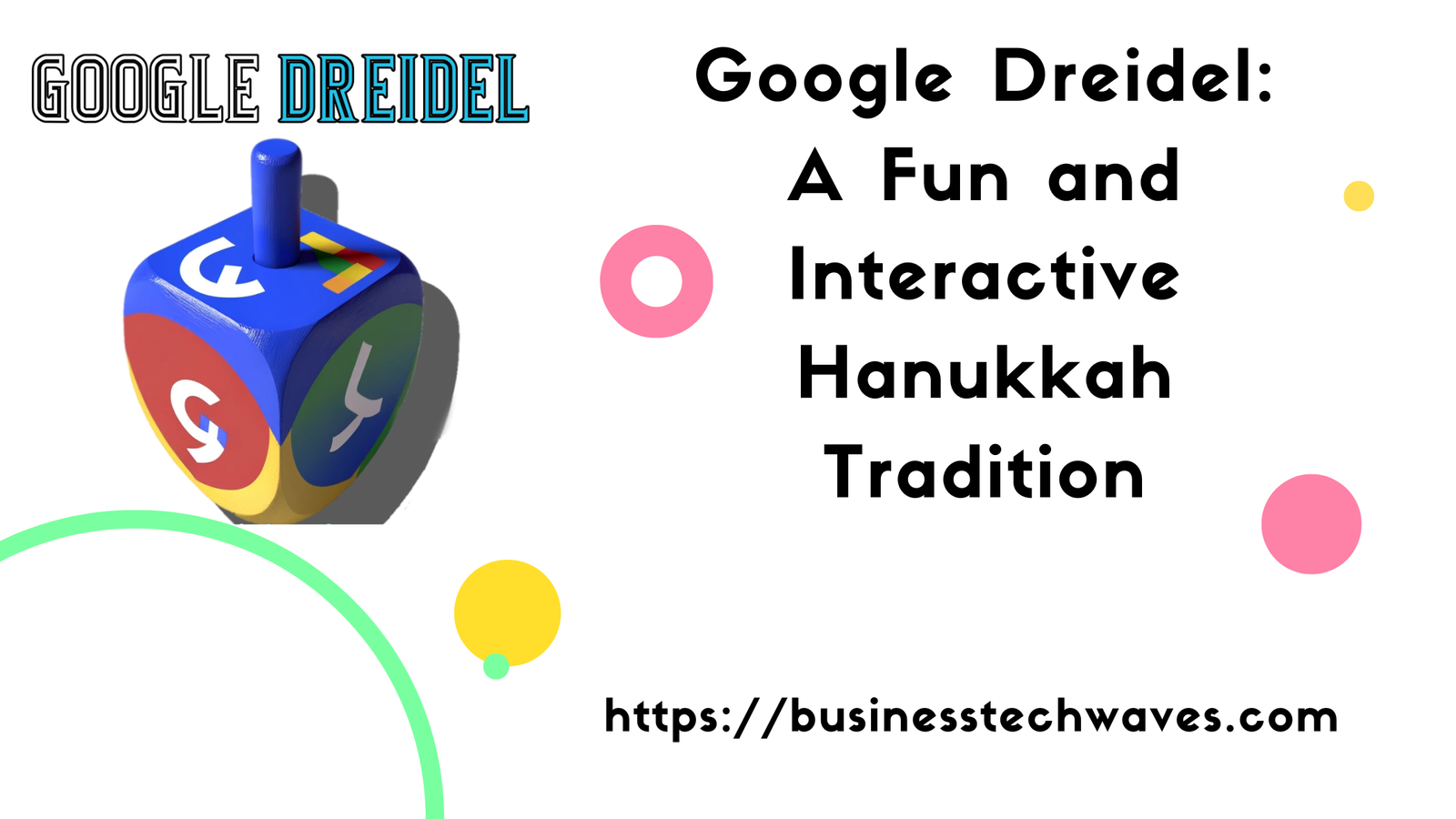
Google Dreidel: A Fun and Interactive Hanukkah Tradition in 2024
Introduction
Every year, as Hanukkah approaches, the internet buzzes with excitement over various holiday-themed activities. One such activity that has gained popularity in recent years is Google’s interactive dreidel game. Combining the charm of traditional dreidel with the innovation of digital technology, Google Dreidel has become a delightful way for people of all ages to engage with this classic Hanukkah pastime. In this article, we will explore the origins and significance of the dreidel, how Google Dreidel works, and why this digital adaptation has captured the hearts of users worldwide.
The Origins of the Dreidel
The dreidel, a four-sided spinning top, is a significant symbol associated with Hanukkah, the Jewish Festival of Lights. Each side of the dreidel bears a Hebrew letter: Nun (נ), Gimel (ג), Hei (ה), and Shin (ש), which together form the acronym for the phrase “Nes Gadol Haya Sham” – meaning “A great miracle happened there.” This phrase refers to the Hanukkah miracle that took place in ancient Judea, where a small quantity of oil miraculously burned for eight days in the rededicated Holy Temple.
The game of dreidel is traditionally played during Hanukkah. The origins of the game are believed to trace back to the time of the Greek-Syrian rule over Judea when Jewish children would study the Torah in secret. If soldiers approached, the children would quickly hide their scrolls and pretend to be playing with tops. Over time, this simple toy evolved into a game that has become a cherished part of Hanukkah festivities.
How the Dreidel Game is Played
The dreidel game is a simple yet entertaining activity that requires a few basic items: a dreidel, a pot (typically filled with coins, chocolate gelt, or other small objects), and a group of players. Each player begins with an equal number of game pieces, and a small pot is placed in the center.
The players take turns spinning the dreidel. Depending on which Hebrew letter the dreidel lands on, the player must follow a specific action:
- Nun (נ) – The player does nothing; the turn passes to the next player.
- Gimel (ג) – The player takes all the items in the pot.
- Hei (ה) – The player takes half of the pot’s contents (rounded up if there is an odd number).
- Shin (ש) – The player must add one piece to the pot.
The game continues until one player has won all the pieces, or players agree to end the game.
Google Dreidel: Bringing Tradition to the Digital Age
Google, known for its playful and creative approach to technology, introduced its version of the dreidel game as part of its interactive Doodle series. The Google Dreidel game made its debut in 2019 and has since become a fun and educational way for people to celebrate Hanukkah. The game is accessible via a simple search query like “play dreidel” or “Hanukkah dreidel” in the Google search bar, leading users directly to the interactive game.
How Google Dreidel Works
Google Dreidel closely mirrors the traditional dreidel game, providing users with a familiar yet engaging experience. Here’s how it works:
- Starting the Game: Upon launching Google Dreidel, users are greeted with a virtual dreidel and a pot of game pieces. The game can be played solo against the computer or with multiple players by taking turns.
- Spinning the Dreidel: To spin the dreidel, users simply click or tap on the dreidel icon. The dreidel then spins and eventually lands on one of the four sides, displaying a Hebrew letter.
- Following the Rules: Just like the traditional game, the letter on which the dreidel lands determines the player’s action. Google Dreidel automatically enforces the game rules, making it easy for users to follow along and enjoy the experience.
- Interactive and Fun: Google’s version adds a layer of interactivity and fun animations, making the game visually appealing and engaging. The cheerful design, complete with sound effects and festive graphics, enhances the holiday atmosphere.
- Educational Value: For those unfamiliar with the dreidel game or the significance of Hanukkah, Google Dreidel also provides a brief explanation of the game and its rules. This educational aspect makes the game accessible to a wider audience, including those who may not celebrate Hanukkah but are interested in learning about it.
The Significance of Google Dreidel
Google Dreidel is more than just a digital game; it represents the fusion of tradition and modern technology. By creating an interactive version of the dreidel game, Google has managed to bring a cherished cultural practice to a global audience, fostering awareness and appreciation for Jewish traditions. Here are a few reasons why Google Dreidel is significant:
- Cultural Preservation: Google Dreidel helps preserve and promote the tradition of playing dreidel during Hanukkah. In a digital age where cultural practices can sometimes be overlooked or forgotten, this game serves as a reminder of the importance of cultural heritage.
- Accessibility: The digital format of Google Dreidel makes it accessible to people all over the world, regardless of whether they have access to a physical dreidel. This accessibility ensures that more people can partake in the holiday tradition, even if they do not have the traditional game materials.
- Education and Awareness: Google Dreidel serves as an educational tool, introducing the story of Hanukkah and the meaning behind the dreidel game to those who may be unfamiliar with it. This helps to promote cultural understanding and awareness, fostering a sense of inclusivity.
- Engagement: The interactive nature of Google Dreidel makes it a fun and engaging way for families to celebrate Hanukkah together. Whether played alone or with others, the game brings people together in the spirit of joy and celebration.
Google Dreidel in the Context of Hanukkah Celebrations
Hanukkah, also known as the Festival of Lights, is an eight-day Jewish holiday that commemorates the rededication of the Second Temple in Jerusalem. During this time, Jewish families light the menorah, say prayers, sing songs, and enjoy traditional foods like latkes and sufganiyot. The dreidel game is often played as part of these festivities, adding a playful element to the holiday celebrations.
Google Dreidel has seamlessly integrated into these Hanukkah traditions. It offers a modern twist on the classic game, making it an exciting addition to the holiday. Families can gather around their digital devices and enjoy the game together, bridging the gap between generations with a mix of tradition and technology.
The Future of Digital Hanukkah Traditions
The success of Google Dreidel hints at the potential for more digital adaptations of cultural and religious traditions. As technology continues to evolve, it opens up new opportunities for preserving and sharing cultural practices in innovative ways. While traditional, in-person celebrations will always hold a special place, digital experiences like Google Dreidel can enhance and complement these practices.
Looking forward, we may see more interactive games, virtual reality experiences, and augmented reality applications that bring various cultural traditions to life. These digital tools can serve as educational resources, cultural ambassadors, and sources of joy for people around the world.
Conclusion
Google Dreidel is a delightful example of how technology can breathe new life into ancient traditions. By offering an interactive and accessible version of the traditional dreidel game, Google has helped to promote and preserve the cultural significance of Hanukkah. Whether played by those who celebrate Hanukkah or by those who are simply curious to learn, Google Dreidel is a fun, engaging, and educational experience.
As we continue to navigate a world increasingly intertwined with digital technology, it is heartening to see how these advancements can be used to celebrate and honor cultural heritage. Google Dreidel serves as a reminder that tradition and technology need not be at odds; instead, they can come together to create meaningful and joyful experiences for all.


